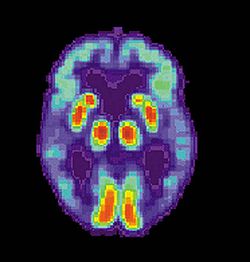Difference between revisions of "Atheism and Alzheimer's disease"
Conservative (Talk | contribs) (→Atheism/theism: Regular prayer/meditation and larger frontal lobes) |
Conservative (Talk | contribs) |
||
| Line 1: | Line 1: | ||
[[File:PET Alzheimer.jpg|thumbnail|250px|right|A PET scan of the brain of an individual with Alzheimer's disease reveals a loss of function in the [[Temporal lobes|temporal lobe]].]] | [[File:PET Alzheimer.jpg|thumbnail|250px|right|A PET scan of the brain of an individual with Alzheimer's disease reveals a loss of function in the [[Temporal lobes|temporal lobe]].]] | ||
WebMd reported in 2005, "Religious practices and spirituality may slow the progression of [[Alzheimer's disease]]."<ref>[https://www.webmd.com/alzheimers/news/20070101/religion-spirituality-slow-alzheimers#1 Religion, Spirituality May Slow Alzheimer's], WebMD, 2005</ref> | WebMd reported in 2005, "Religious practices and spirituality may slow the progression of [[Alzheimer's disease]]."<ref>[https://www.webmd.com/alzheimers/news/20070101/religion-spirituality-slow-alzheimers#1 Religion, Spirituality May Slow Alzheimer's], WebMD, 2005</ref> | ||
| + | |||
| + | The abstract for the journal article ''Spirituality, religion, and Alzheimer's disease'' published in the ''Journal of Health Care Chaplaincy'' indicates: | ||
| + | {{Cquote|The chaplain's ministry to persons with dementia, often of the Alzheimer's type, is vitally relevant to their clinical well-being. No chaplain should even think that because someone is demented, they can no longer be reached spiritually. While few scientific studies exist, clinical experience and anecdotal accounts suggest that selected pastoral interventions can enhance the quality of life of the mildly, moderately, and even severely demented individual.<ref>[Spirituality, religion, and Alzheimer's disease.] by SG1, Whitehouse PJ., ''Journal of Health Care Chaplaincy'', 1999;8(1-2):45-57.<ref>}} | ||
Alzheimer's disease is "characterised by loss of neurons and synapses in the [[cerebral cortex]] and certain subcortical regions. This loss results in gross atrophy of the affected regions, including degeneration in the [[temporal lobes|temporal lobe]] and [[parietal lobe]], and parts of the frontal cortex and cingulate gyrus.<ref>http://www.news-medical.net/health/Neurodegeneration-in-Alzheimers-and-Parkinsons.aspx</ref> Some of the primary symptoms of alzheimer's disease are: memory problems, mood swings, emotional outbursts, brain stem damage which impairs function in the heart, lungs plus causes disruption of various other bodily processes.<ref>http://www.dementiacarecentral.com/node/559</ref> | Alzheimer's disease is "characterised by loss of neurons and synapses in the [[cerebral cortex]] and certain subcortical regions. This loss results in gross atrophy of the affected regions, including degeneration in the [[temporal lobes|temporal lobe]] and [[parietal lobe]], and parts of the frontal cortex and cingulate gyrus.<ref>http://www.news-medical.net/health/Neurodegeneration-in-Alzheimers-and-Parkinsons.aspx</ref> Some of the primary symptoms of alzheimer's disease are: memory problems, mood swings, emotional outbursts, brain stem damage which impairs function in the heart, lungs plus causes disruption of various other bodily processes.<ref>http://www.dementiacarecentral.com/node/559</ref> | ||
Revision as of 04:33, February 11, 2019

WebMd reported in 2005, "Religious practices and spirituality may slow the progression of Alzheimer's disease."[1]
The abstract for the journal article Spirituality, religion, and Alzheimer's disease published in the Journal of Health Care Chaplaincy indicates:
{{Cquote|The chaplain's ministry to persons with dementia, often of the Alzheimer's type, is vitally relevant to their clinical well-being. No chaplain should even think that because someone is demented, they can no longer be reached spiritually. While few scientific studies exist, clinical experience and anecdotal accounts suggest that selected pastoral interventions can enhance the quality of life of the mildly, moderately, and even severely demented individual.Cite error: Closing </ref> missing for <ref> tag Some of the primary symptoms of alzheimer's disease are: memory problems, mood swings, emotional outbursts, brain stem damage which impairs function in the heart, lungs plus causes disruption of various other bodily processes.[2]